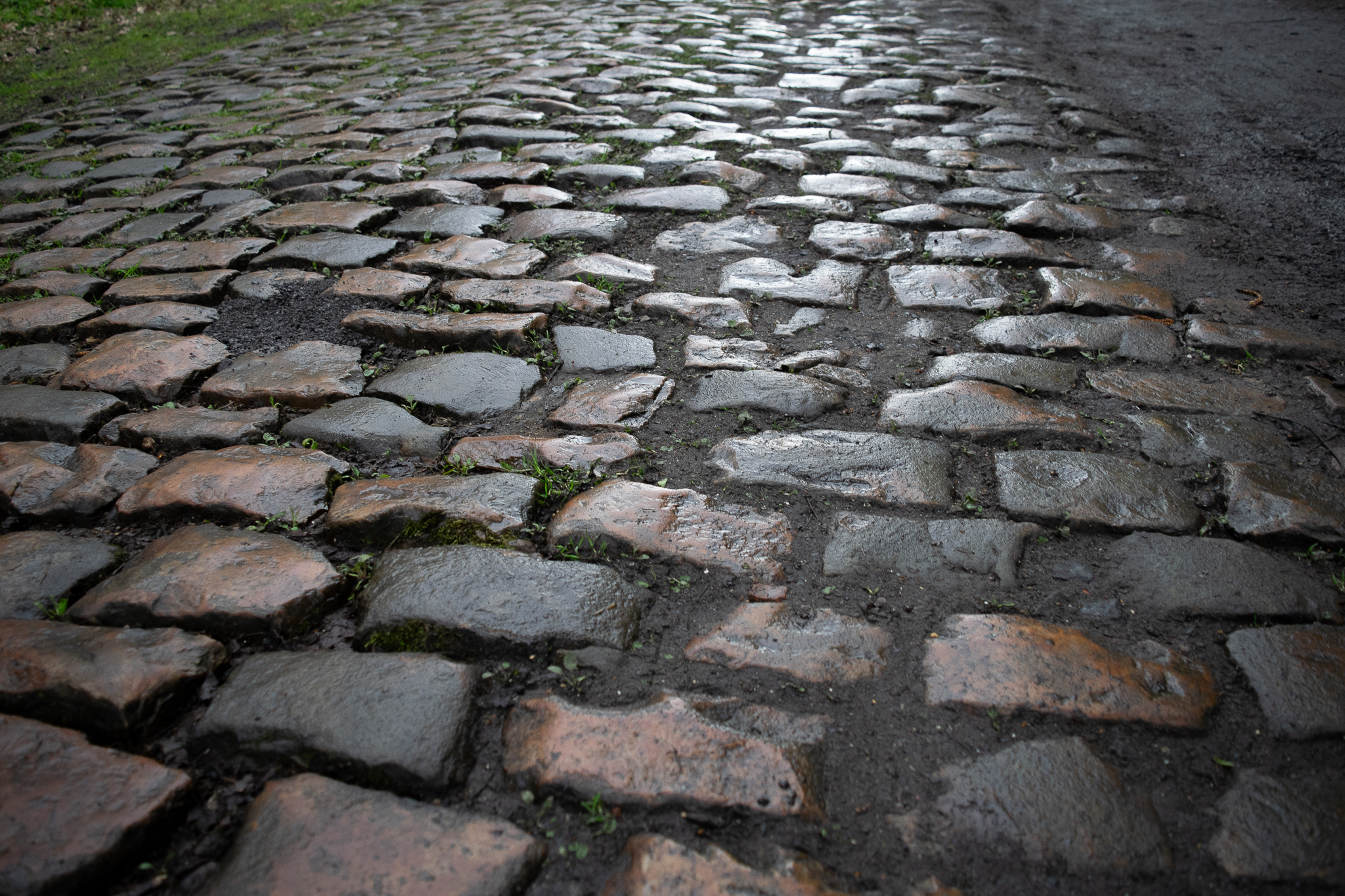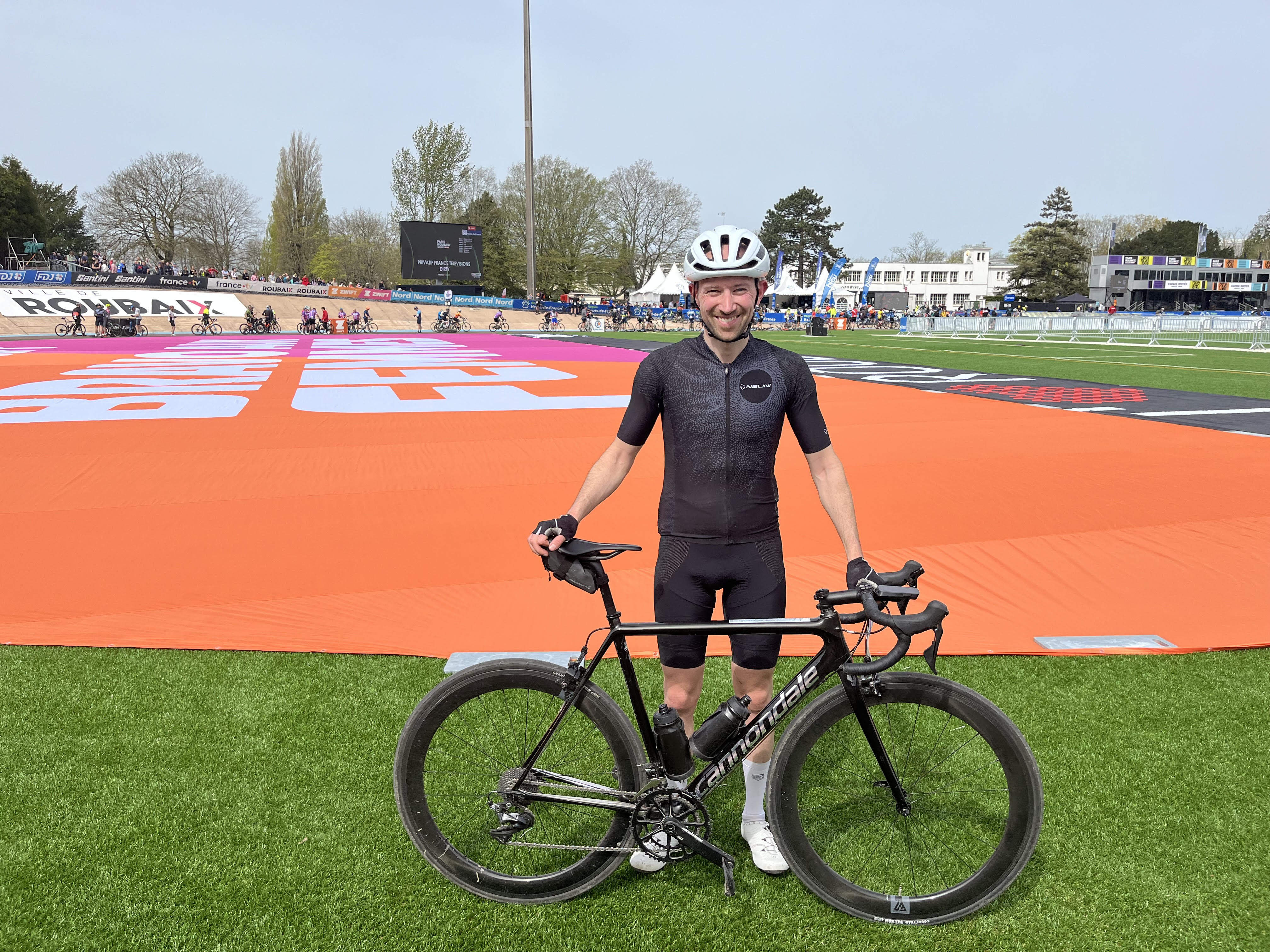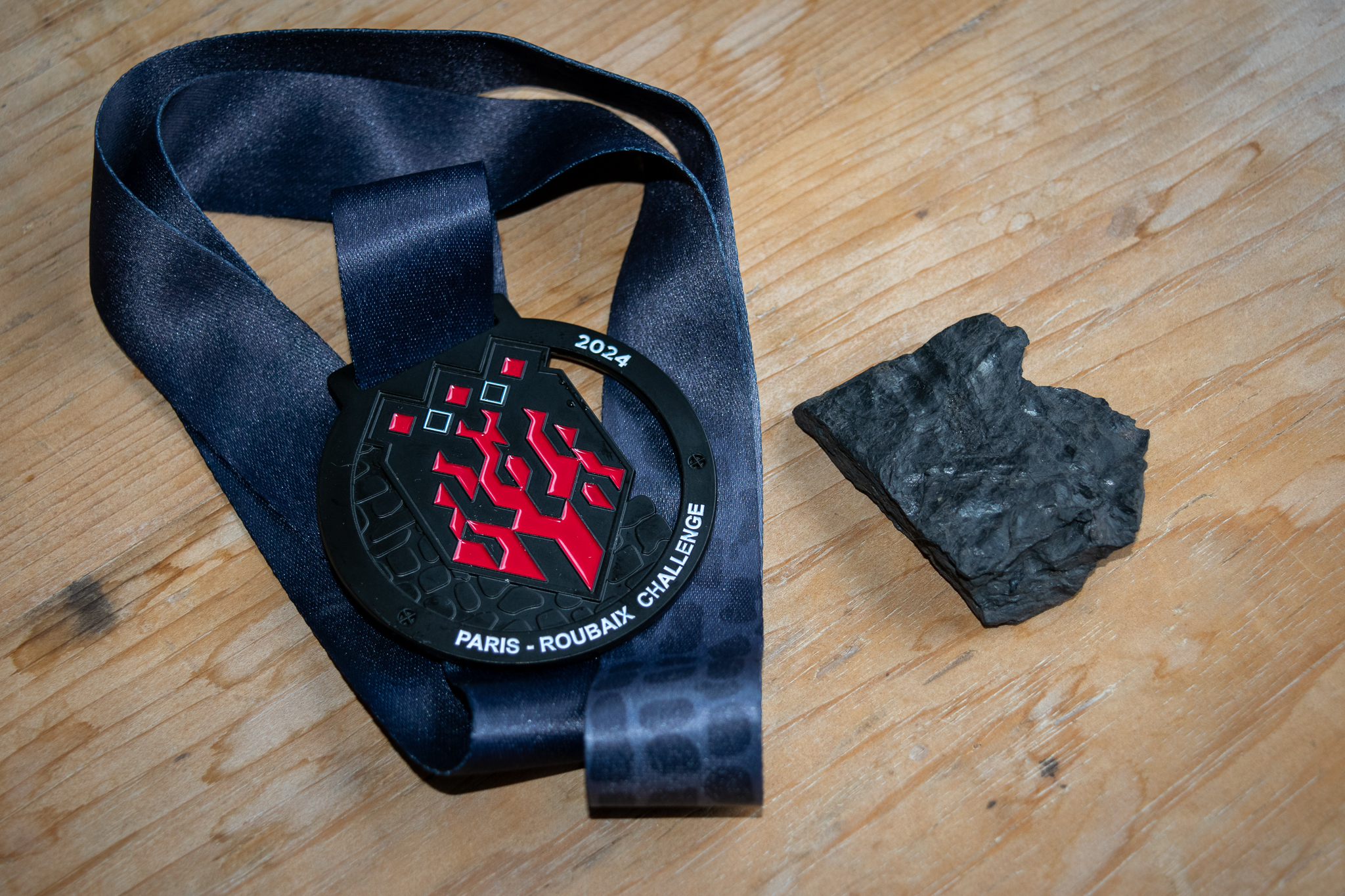Riding the Paris-Roubaix Challenge: Project Best Winter Ever bonus edition
Rounding off the Best Winter Ever series with a Saturday in Hell

Welcome to the final bonus edition of 'Project Best Winter Ever,' a series in which I've documented my first winter as a new dad and how I aimed to make it my best ever on the bike, with a little help from the indoor cycling app, Zwift.
If you want to read the other instalments, you can find them here:
1. How I plan to make my first winter as a new dad my best one yet on the bike
2. Outdoor riding and near misses
Back in Autumn, Zwift kindly loaned me a Hub One smart trainer and I made good use of it as a time-crunched new dad. I'm sure any cyclists who become new parents can attest to the fact that the bike is going to take a back seat when little ones arrive, so jumping on the trainer for a quick workout was a lot easier to fit in, and using Zwift and its array of workouts, races and training sessions helped keep things fresh and stimulating as winter took hold. Indoor training generally always offers a quality workout and though it isn't all that glamorous at times, it's certainly effective if you want to try and build or maintain fitness.
I wasn't planning on setting the world alight this winter. With our first child to look after and a new routine to adapt to, this certainly wasn't going to be a winter filled with big volume weeks and training tunnel vision. The main goal I outlined was to emerge from the winter with a decent fitness level. To achieve this, I wanted to stay stimulated by Zwifting, to explore what Zwift had to offer alongside the Zwift Hub One trainer, and to try new things both indoors and out.
As the series neared its end, Zwift - coincidentally the title sponsor of Paris-Roubaix Femmes Avec Zwift - offered me a spot riding the Roubaix Challenge, the sportive that takes place on the morning of the women's race, as a way of rounding off my winter and keep me motivated into spring. Naturally, I jumped at the chance. As well as being a fantastic challenge, an opportunity to experience some legendary roads for myself and to do something new, it seemed a solid way to put my winter training and Zwifting to the test.

The fourth instalment of this series came back in December. I gave myself a 'not bad' regarding where I thought I was at. Moving into the new year I had learnt a few things and had embraced just jumping onto the smart trainer a few times a week without fail. A key was riding later after our daughter was asleep and in bed instead of trying to squeeze my workout in beforehand. It was later but it meant no rushing, and I soon found some fitness starting to develop through consistently knocking off the sessions week after week. It was a timely reminder that consistency is key and that quietly chipping away at things will yield results.
I've been getting out for early Saturday morning chain-gang rides and knew I was comfortable up to around 70 miles or four hours with at least 90 minutes of hard riding thrown in. Roubaix was to be my longest ride so far of the year at 145km (90 miles) but I felt pretty confident the event atmosphere and added excitement would be a useful tool in helping me tick off the extra distance. This proved to be the case. If anything, the distance flew by.
I decided to ride my own road bike - a Cannondale SuperSix Evo - for the Roubaix Challenge, rather than risk the positional differences of the few bikes I currently have in for review. We've shared a lot of big rides together and this felt like a solid adventure to complete together too.
Get The Leadout Newsletter
The latest race content, interviews, features, reviews and expert buying guides, direct to your inbox!
In terms of bike preparation, I swapped out my latex inner tubes for butyl ones for a bit of added durability. I swapped from 25mm to 28mm tyres in the form of Goodyear Vector 4 Seasons models. I ride a lot of tubeless tyres but am content in usually running latex tubes and fast clinchers on my own bike. The tough-feeling sidewalls of the Goodyear tyres gave me confidence, and I felt they would offer decent protection from sidewall cuts from the cobblestones.
Elsewhere, I swapped my bottle cages for sturdier ones to prevent bottles from bouncing free, and swapped the lightweight alloy bolts for steel ones with Loctite on the threads. I finished things off with a full bolt check and torque over, and swapped to a bigger saddlebag which I could fit more spares into, just in case.
The weather forecast was good for the day and after a decent night's sleep, I woke early as it was getting light. Breakfast was a bowl of porridge and a strong black coffee, and soon I slipped out of the Cyclingnews team Airbnb.
It was just about light as I set off on the empty Belgian roads for my five-mile ride across the border into France and on to the famous Roubaix Velodrome where the ride would begin.
It was cold enough to blow away the cobwebs and wake the legs up, but I wasn't uncomfortable in my shorts, jersey, arm warmers and track mitts.
I decided not to wear any more kit as I would have only ended up carrying it during the ride as the temperatures rose through the day. I joined a large queue at the velodrome as music blared, the announcer's excited tones helped create a buzz in the air and thousands of cleated cycling shoes shuffled toward the start and the beginning of our collective Saturday in Hell.

Riders taking part in the Roubaix Challenge are set off in good-sized groups at intervals to ensure traffic can still function as the thousands of riders make their way out of the town.
I was riding the Medium or 'Legendary' option of the Roubaix Challenge which is 146km long and covers 19 sectors of pavé. Riders can choose to cover 70- and 170km routes too.
The early part of my ride was spent trying to tread a fine balance. I was keen to avoid biting off more than I could chew in the early part, but the first 50km of smooth cobble-free roads represented a good chance to cover ground quickly, so I wanted to ride in a group moving at a decent pace. I jumped between a couple of groups who were moving along nicely and ticked off the first hour at about 28km/h average.
We passed through quiet villages and towns separated by rural country lanes. I eventually teamed up with a fast-moving group of five French riders for about 15km in the run-up to the Arenberg Forest and we ticked off the kilometres quickly.
Conveniently the Forest of Arenberg is the first sector to be tackled on the 145km route and you pass through forest-flanked roads for a few kilometres before you arrive at that mythical and foreboding stretch of road. I couldn't help but let my mind wander in the run-up and thought of the invisible tyre tracks of the champion cyclists I was following, and of all the historic racing that quiet section of forest in Northern France has witnessed. But I had a quick word with myself to remember the basics, tightened my helmet and shoes (in a desperate effort to feel ready) and got ready to hit the trench.
Arenberg was savage and was by far the most challenging section of pavé on the Roubaix route. I have never ridden anything like it on a road bike. It was just about holding on. I think I was close to puncturing at times and I felt numerous rim hits, I tried my best to not put too much weight through the the front end of the bike to minimise the chance of pinching the front tube. My 28mm tyre and inner tube combination paired with carbon wheels made for a harsh ride and 28s are probably old hat for Roubaix now. Most racers use 30 or 32mm tyres for more comfort and speed, and I don't blame them.
If you think the pro riders at the front look fast on the TV riding Arenberg, let me tell you that they are absolutely flying. The power and strength it takes to cover that section of road at that speed is incredible and I have another level of newfound admiration for the way they ride Arenberg. I also expect many will be holding on and simply praying that they don't puncture. Unlike me, they don't have the option to back off and try to protect the bike.
I made it through the forest unscathed though, and rode the whole thing straight down the middle. I passed plenty of riders at the sides of the road with flats and feel lucky not to have picked one up myself. I stopped briefly at the end to take stock and do a quick bike check for buckled wheels, loose parts and rattly bottle cages. I wasn't racing, so I repeated this after every few sections of pavé and would recommend it for safety and peace of mind. I set off again and was ready to tackle the next cobblestones lying in wait.

After Arenberg at the 50km mark, the cobbles come thick and fast and most sections after that come every handful of kilometres. Sectors are graded for severity with a star rating system for roughness and length and I used the handy Challenge tob tube sector sticker to gauge what was coming up and when.
The cobbles require more power delivery to get over them quickly and smoothly and to overcome the resistance the cobbles themselves create. The effort begins to take its toll after a while, likewise the impact from the rough roads on your body. It's a slow wearing down and fatiguing process and some specific training sessions will stand you in good stead for Roubaix. I did feel at times that all the ERG-mode turbo work had given me the ability to just keep turning the pedals over in the way you do on the smart trainer.
I talked about using the Zwift Hub One smart trainer in previous pieces and have continued to train indoors a few times a week into the spring as it's easy and fast to get a workout in around the more important responsibility that is parenthood.
Work on the smart trainer is perfectly suited to the efforts of the Roubix Challenge in my opinion. The generally flat course means you are 'on the pedals' for lengthy stretches without freewheeling and the constant effort of a smart trainer session is really well suited to the terrain at Roubaix. There were probably no more than five stretches of road where I could freewheel at speed and knock the effort off, and I had plenty of tailwinds. There's a lot of pedalling at Roubaix.
It would be remiss of me not to mention Mathew Hayman whilst talking about Roubaix and Zwift. Hayman famously won at Roubaix in 2016 after using Zwift extensively in the run-up when coming back from a broken arm. After riding it I could see how the constant pedalling of an intense indoor session would be suited to the demands of the Roubaix and whilst you will need the endurance required to complete the distance, specific efforts will really stand you in good stead for the high-power efforts needed for the pavé sectors. Zwift also has a specific Mat Hayman Paris Roubix workout which you can complete in the app if you're gearing up for the event.
I made sure to keep fuelling all day and started with two bottles with 90 grams of carbs plus several 45-gram energy gels. I stocked up at the second two feed zones and felt well-fuelled all day. I saved a caffeine gel for the last 25km and was able to open the taps and get it all out on the road in the last kilometres on the way to the velodrome.

Rolling into the Roubaix Velodrome feels special and it's great that Challenge riders can enjoy a half lap of the legendary track to finish off their own personal Roubaix Challenge as well. It was great to roll to a halt in the sunshine and soak in the event and a fantastic day of riding.
The Roubaix Challenge also leaves you with a few hours to recover and relax before the Paris-Roubaix Femmes Avec Zwift finishes at the velodrome if you want to stay and watch. Showers are available on-site so you can freshen up and grab a beer before the world's best female racers roll in. The roar from the crowd as they enter the Roubaix Velodrome is something else and I'd recommend it.
Riding the Roubaix Challenge solo gave me more time be alone with my thoughts on what is otherwise a hectic weekend for a cycling journalist. I had a nice moment at the finish standing in the sun with a beer and thought about the long, dark winter months when it seemed like riding in shorts and jersey would never happen again - something all cyclists feel in the depths of winter.
I must also confess to wondering if I would still be easily able to do things like this now that our first child is here. Being able to tick off the Roubaix Challenge trouble-free and stand tired but happy in the warm April sunshine with thousands of other cyclists felt fantastic.

Tom joined the Cyclingnews team in late 2022 as a tech writer. Despite having a degree in English Literature he has spent his entire working life in the cycling industry in one form or another. He has over 10 years of experience as a qualified mechanic, with the last five years before joining Cyclingnews being spent running an independent workshop. This means he is just as happy tinkering away in the garage as he is out on the road bike, and he isn’t afraid to pull a bike apart or get hands-on with it when testing to really see what it’s made of.
He has ridden and raced bikes from an early age up to a national level on the road and track, and has ridden and competed in most disciplines. He has a keen eye for pro-team tech and enjoys spotting new or interesting components in the wild. During his time at Cyclingnews, Tom has already interviewed some of the sport's biggest names including Mathieu van der Poel, Tadej Pogačar and Alberto Contador. He's also covered various launches from brands such as Pinarello, Ridley, Specialized and more, tackled the Roubaix Challenge sportive aboard his own rim-brake Cannondale SuperSix Evo, tested over 20 aero helmets in the wind tunnel, and has created helpful in-depth buying advice relating to countless categories from torque wrenches to winter clothing.
